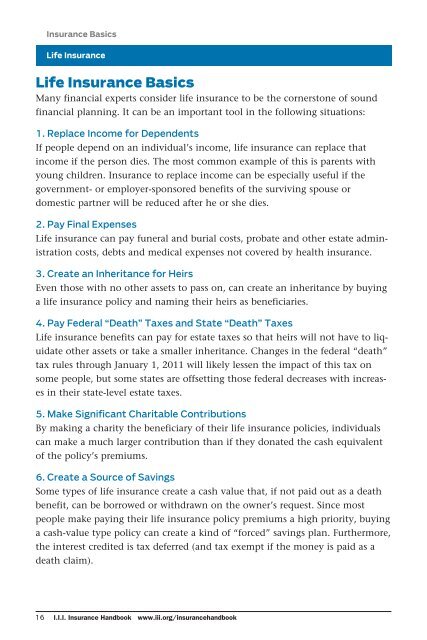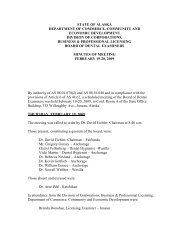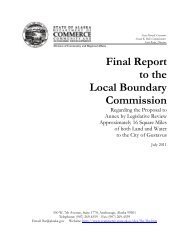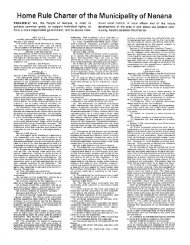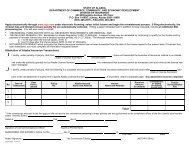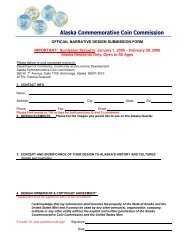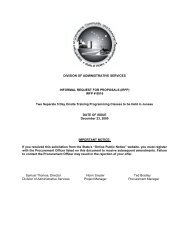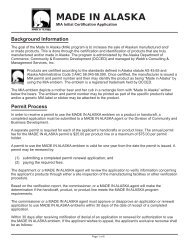Insurance Handbook - Alaska Department of Community and ...
Insurance Handbook - Alaska Department of Community and ...
Insurance Handbook - Alaska Department of Community and ...
Create successful ePaper yourself
Turn your PDF publications into a flip-book with our unique Google optimized e-Paper software.
<strong>Insurance</strong> Basics<br />
Life <strong>Insurance</strong><br />
Life <strong>Insurance</strong> Basics<br />
Many financial experts consider life insurance to be the cornerstone <strong>of</strong> sound<br />
financial planning. It can be an important tool in the following situations:<br />
1. Replace Income for Dependents<br />
If people depend on an individual’s income, life insurance can replace that<br />
income if the person dies. The most common example <strong>of</strong> this is parents with<br />
young children. <strong>Insurance</strong> to replace income can be especially useful if the<br />
government- or employer-sponsored benefits <strong>of</strong> the surviving spouse or<br />
domestic partner will be reduced after he or she dies.<br />
2. Pay Final Expenses<br />
Life insurance can pay funeral <strong>and</strong> burial costs, probate <strong>and</strong> other estate administration<br />
costs, debts <strong>and</strong> medical expenses not covered by health insurance.<br />
3. Create an Inheritance for Heirs<br />
Even those with no other assets to pass on, can create an inheritance by buying<br />
a life insurance policy <strong>and</strong> naming their heirs as beneficiaries.<br />
4. Pay Federal “Death” Taxes <strong>and</strong> State “Death” Taxes<br />
Life insurance benefits can pay for estate taxes so that heirs will not have to liquidate<br />
other assets or take a smaller inheritance. Changes in the federal “death”<br />
tax rules through January 1, 2011 will likely lessen the impact <strong>of</strong> this tax on<br />
some people, but some states are <strong>of</strong>fsetting those federal decreases with increases<br />
in their state-level estate taxes.<br />
5. Make Significant Charitable Contributions<br />
By making a charity the beneficiary <strong>of</strong> their life insurance policies, individuals<br />
can make a much larger contribution than if they donated the cash equivalent<br />
<strong>of</strong> the policy’s premiums.<br />
6. Create a Source <strong>of</strong> Savings<br />
Some types <strong>of</strong> life insurance create a cash value that, if not paid out as a death<br />
benefit, can be borrowed or withdrawn on the owner’s request. Since most<br />
people make paying their life insurance policy premiums a high priority, buying<br />
a cash-value type policy can create a kind <strong>of</strong> “forced” savings plan. Furthermore,<br />
the interest credited is tax deferred (<strong>and</strong> tax exempt if the money is paid as a<br />
death claim).<br />
16 I.I.I. <strong>Insurance</strong> <strong>H<strong>and</strong>book</strong> www.iii.org/insuranceh<strong>and</strong>book


